Once upon a time, asset management ranked alongside oil as one of the most profitable industries per employee. But the 2008 financial crisis ended that.
Nowadays, the industry is defined by ever-tougher regulation and ever-lower margins. Almost every week, it seems, another money manager goes under.
Still, 2019 proved a bumper year for ETF providers. Total industry assets grew more than 50% to hit $62 billion. The tidal rise, helped along by a thundering equity market, has meant Australia’s ETF market is one of the fastest-growing in the world.
But who were the winners? And what were the highlights? Below we take a look.
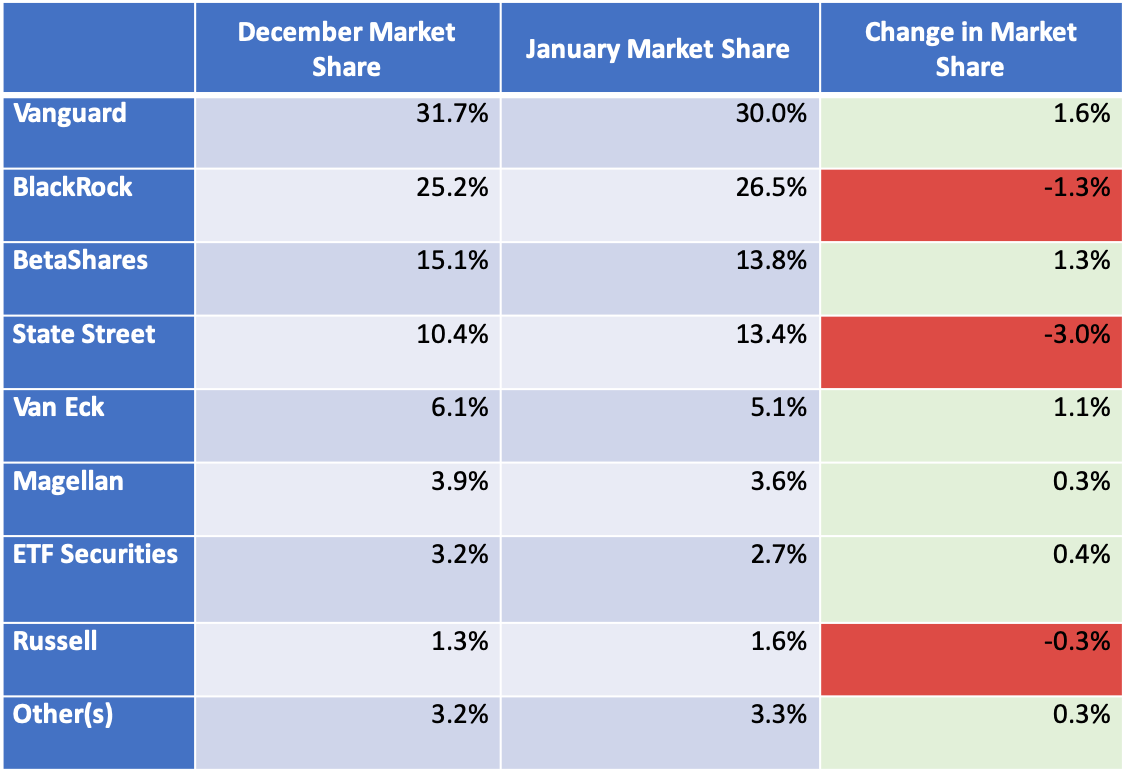
Vanguard – Beta King
Vanguard continued its domination of the ETF industry in 2019, devouring 37% of new inflows. Vanguard’s market share grew to 32% at the expense of BlackRock, its top competitor.
Why is Vanguard doing so well? Partly thanks to its low fees, its reputation for which was reinforced by fee cuts in 2019.
Being low fee has allowed Vanguard to control the commoditised core product market. As inflow data shows, Aussie investors looking for core Australian shares, international shares, property and bond ETFs – prefer to come to Vanguard. The Vanguard Australian Shares Index ETF (VAS) has proved a particular hit, licking up almost $1 billion by itself.
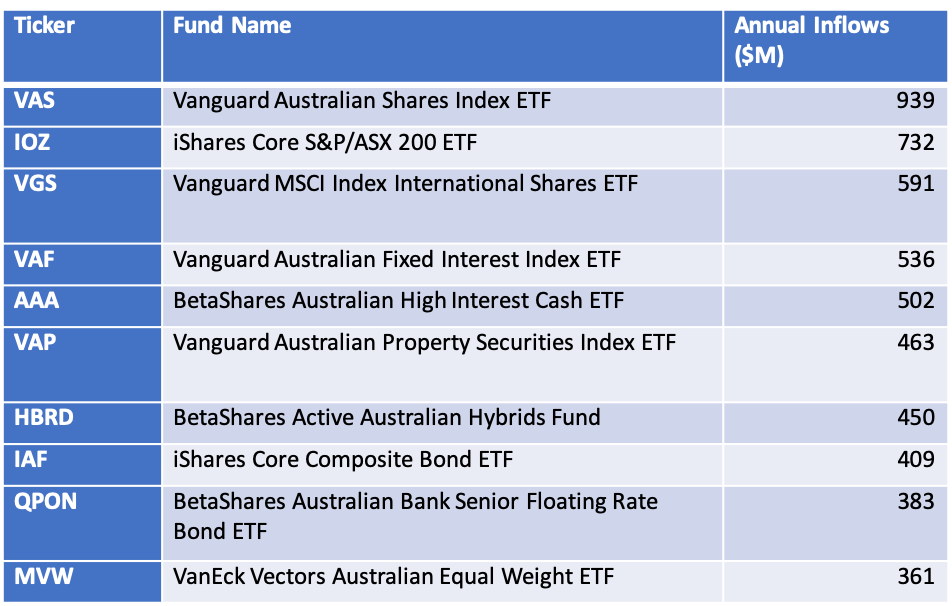
Vanguard’s success also owes to the fact that it is massive. By some counts, Vanguard’s Melbourne-based salesforce make up nearly half the total staff in Australia’s ETF industry. For 2020, the big question for Vanguard – or Vanguard watchers – is what its new Investor Portal will look like.
BetaShares – Rise and Rise
BetaShares is majority owned by Mirae Asset, the Korean funds giant. Mirae is a legacy shareholder, acquiring its majority stake in BetaShares when it bought out Horizons, the Canadian ETF issuer.
Whether by skill or by chance, Mirae’s buying into BetaShares when it did, might prove one of its best investment decisions ever. (Mirae has not always got its acquisitions right).
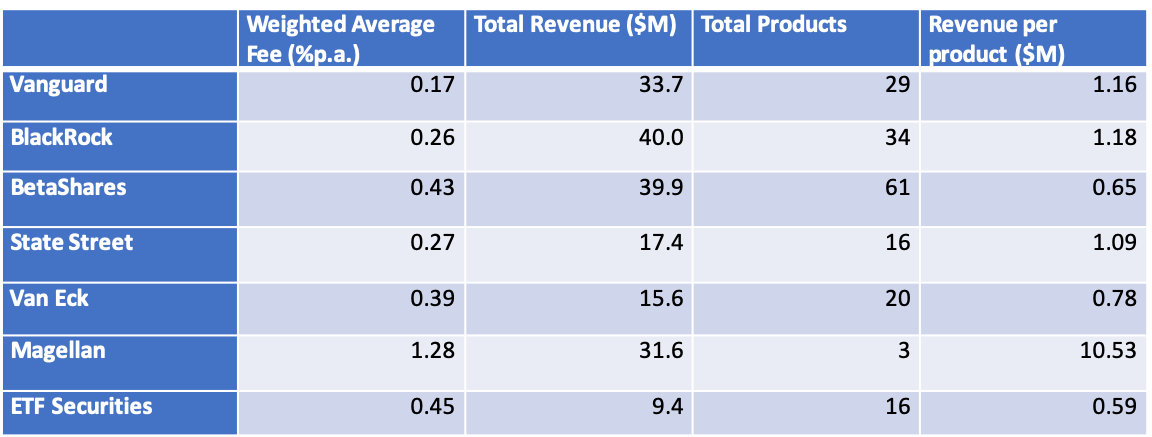
BetaShares in 2019 overtook State Street in terms of market share and overtook BlackRock in terms of inflow capture. BetaShares rise is nothing short of stunning, and looks kind of like a reverse State Street. BetaShares growth has been driven by its founders’ willingness to keep doubling down: every time earnings grow, BetaShares hires more staff and builds more products. This then drives earnings growth further.
For me, it will be interesting to see what BetaShares founders do in 2020.
Van Eck – Successful Smart Beta
Van Eck almost doubled its funds under management and revenue in 2019, making it the company’s best year ever. Three of the main engines driving its success are its smart beta products QUAL, MVA and MVW, which worked to raise the company’s FUM by over $1 billion.
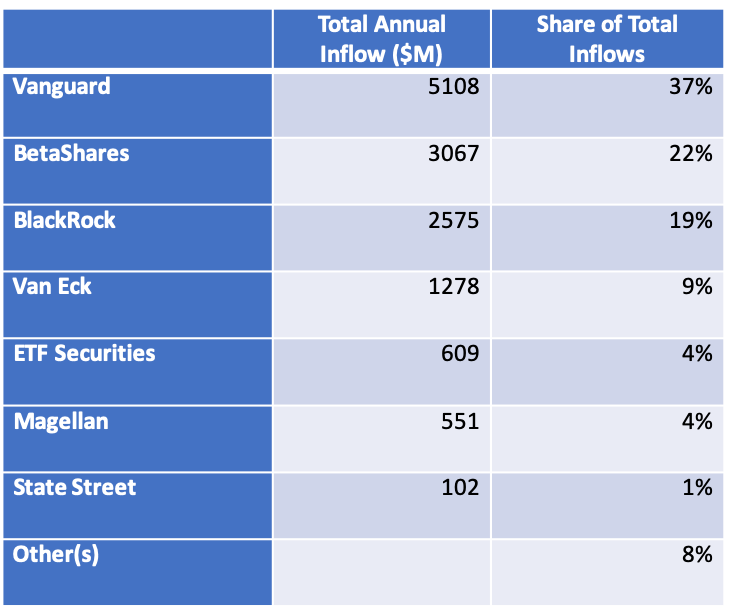
The success of Van Eck’s smart beta products is deserved. They have outperformed their market weighted competitors from Vanguard (VGS, VAP and VAS, respectively) over the past 5 years. Their inflows have proved that investors are willing to pay higher fees for higher performance.
ETF Securities – Gold Came Back
ETF Securities also had a strong year, thanks in large part to the resurgent gold market. Gold has always had sceptics, but their numbers seemed to multiply the longer the yellow metal traded sideways. 2019 was the year that gold’s old faithful got their reward. (Maybe the same will happen soon with value investors.)
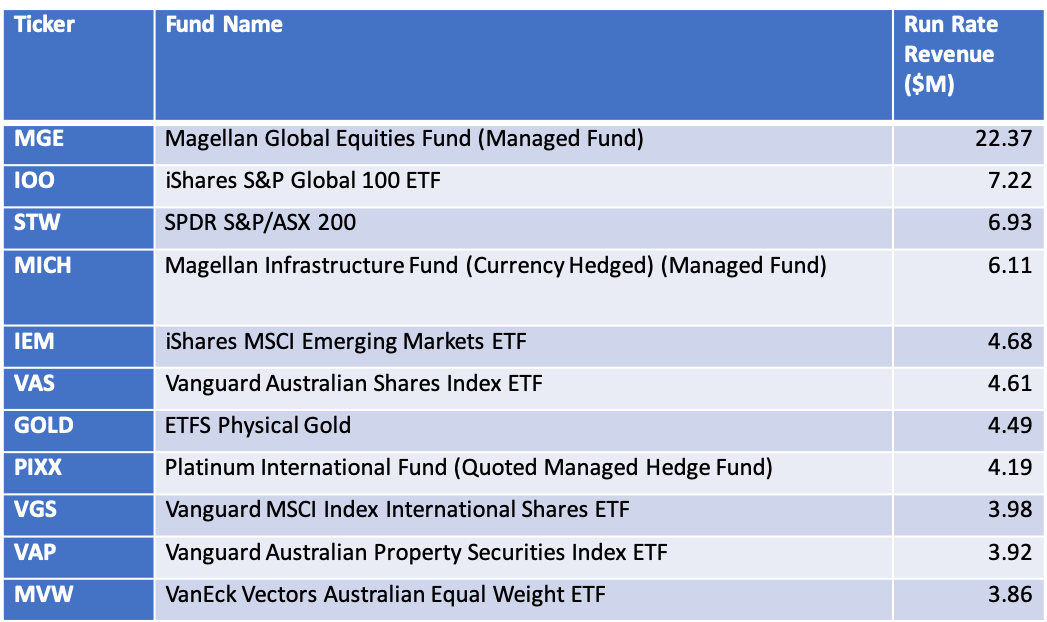
Thanks largely – but not entirely – to gold, the company’s FUM hit $2 billion while revenue edged towards $10 million. ZYAU, the company’s buyback ETF, has helped prove that the buyback approach works in Australia as well as the US.
BlackRock – Where Next?
iShares lost market share in 2019, thanks to unrelenting pressure from Vanguard on their core product line. While inflows were still substantial, and iShares overall profitability remains the highest of any Aussie ETF provider, iShares’ future in Australia seems increasingly challenged.
A simple turnaround for iShares might be to invest. By hiring more staff, building more products and a bigger marketing machine, iShares could reclaim lost ground. And indeed, one suspects iShares will list more ETFs in 2020.
However, BlackRock’s US headquarters have made it clear the company will be a leaner business in future. (BlackRock fired 3% of its staff globally after its share price got whacked in 2018).
Given that BlackRock is the only serious competitor to Vanguard and the only ETF provider with the scale to innovate on core products, one hopes the company keeps a focus on Australia.
State Street – Not Fade Away
State Street’s market share fell 3% in 2019. The company attracted only 1% of total inflows. In July 2013, State Street had 34% market share. Today that figure has fallen to 10%. State Street’s ETF business has seen declining market share globally, not just in Australia.
The Aussie ETF providers that made it rich in 2018
Why is State Street declining? The Wall St Journal ran an interesting investigative piece that claimed State Street’s big bosses simply didn’t listen to its ETF staff, who were warning for years that the ETF market was rapidly growing and changing.
One hopes that State Street can find a way back. There is still time; it is not too late.








